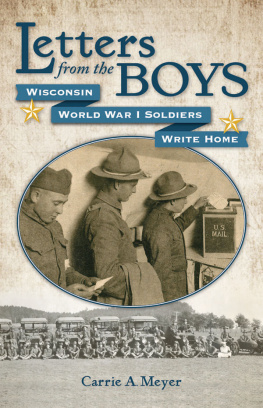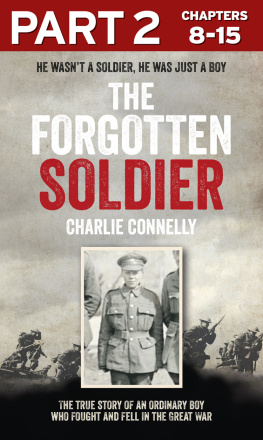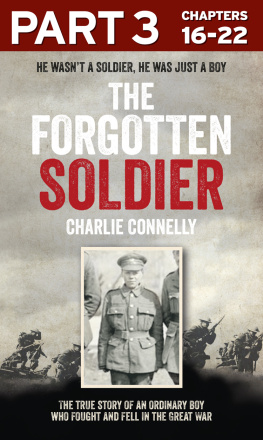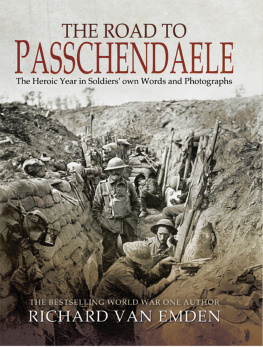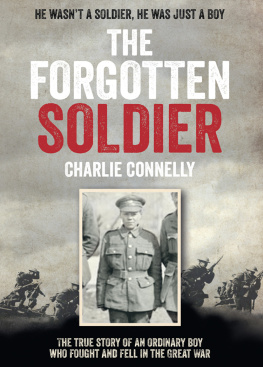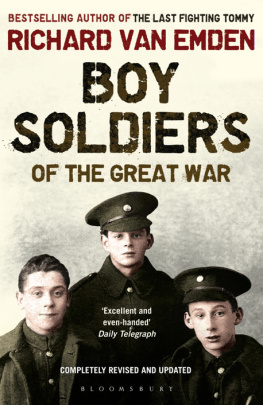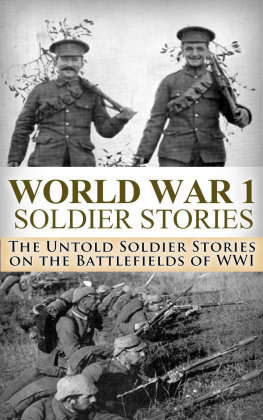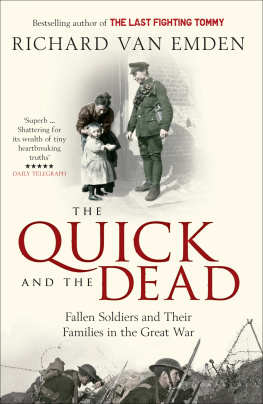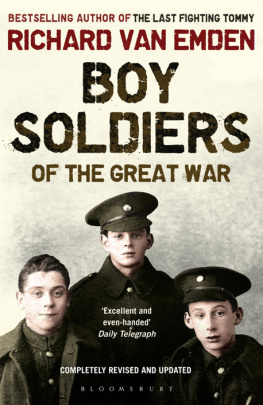Tickled to Death to Go
Veterans: The Last Survivors of the Great War
Prisoners of the Kaiser
The Trench
Last Man Standing
All Quiet on the Home Front
Britains Last Tommies
The Last Fighting Tommy (with Harry Patch)
Famous
The Soldiers War
Sapper Martin (Editor)
Tommys Ark
The Quick and the Dead
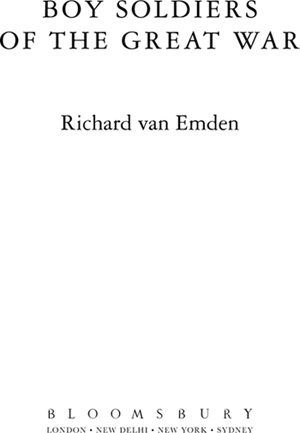
First published in Great Britain 2005 by Headline Book Publishing
This electronic edition published in August 2012 by Bloomsbury Publishing Plc
Copyright 2012 by Richard van Emden
The moral right of the author has been asserted
All rights reserved
You may not copy, distribute, transmit, reproduce or otherwise make available this publication (or any part of it) in any form, or by any means (including without limitation electronic, digital, optical, mechanical, photocopying, printing, recording or otherwise), without the prior written permission of the publisher. Any person who does any unauthorised act in relation to this publication may be liable to criminal prosecution and civil claims for damages
Bloomsbury Publishing Plc
50 Bedford Square
London WC1B 3DP
Bloomsbury Publishing, London, New Delhi, New York and Sydney
Every reasonable effort has been made to trace copyright holders of material reproduced in this book, but if any have been inadvertently overlooked the publishers would be glad to hear from them. For legal purposes the acknowledgements and sources constitute an extension of the copyright page
A CIP catalogue record for this book is available from the British Library
eISBN: 978 1 4088 2813 7
Visit www.bloomsbury.com to find out more about our authors and their books
You will find extracts, author interviews, author events and you can sign up for newsletters to be the first to hear about our latest releases and special offers
This book is dedicated to the memory of my father,
Wolfgang van Emden, 19312002
Contents
In August 1914 a young private named John Parr was shot and killed near the Belgian town of Mons. Officially recorded by the Commonwealth War Graves Commission as aged twenty, he had in fact just celebrated his seventeenth birthday when he died. That he lied about his age on enlistment and had fallen in the service of his country was hardly a revelation. It was who he was that was so significant. This former golf caddie from London was the very first of three-quarters of a million British servicemen to die in the Great War and the truth about his real age came as a shock. I had never investigated the British Armys first casualty because I thought I knew his age.
It is seven years since Boy Soldiers of the Great War was first published, time enough to collect much additional material for a revision. All authors know to their irritation that a book is never truly finished, no story fully told: it is always a work in progress. The story of how Britain passed a generation of young boys as fit to fight on the Western Front is one that continues to grip my imagination, and since 2005 I have kept a keen look out for new facts and details.
There are many new and poignant stories. There is the thirteen-year-old boy who impersonates his elder brother and reaches the Western Front with no knowledge of even how to hold a gun; there is the sad case of an apparently healthy sixteen-year-old who, after serving for months on the Western Front, dies within hours of finally gaining his release from the army, and there is the boy who deserts after breaking down under fire. Such additional stories have helped to broaden the scope of the book, adding new original source material to what was already published.
It is not just the stories of boys own experience that have been developed but also those of families at home, the nervous, sometimes panic-stricken, parents who fought to get sons released from the forces. Their correspondence with the military authorities is analysed in greater detail, throwing new light on the official attitude to under-age soldiering, as well as the plight of parents, many of whom had already lost one or more sons in the war. In particular, as voluntary recruitment slumped in the summer of 1915, the degree to which recruitment sergeants harried and chased boys into the forces has been further explored, with remarkable hitherto unpublished stories.
During the course of my research, I studied in depth the service records held at the National Archives, in particular the pension records (WO364), from which I extracted the histories of 2,046 lads discharged as having made a mis-statement about their age. Within this number, I also identified details of 251 boys who served in a theatre of war while under age. From the size of the sample and from the wealth of information collected, it has been possible to make the first-ever assessment of their service as a group or class, not just as individuals. Fascinating patterns emerge. What was the difference between stated and true age? What proportion of all under-age soldiers was discharged quickly or managed to serve overseas? When did they enlist and did the numbers ebb and flow depending on external factors, such as news of enemy atrocities? What was their average height and weight, where did they come from, and what were their jobs? How long did they serve overseas and does the evidence point to boys who were unable to cope? These and many other questions will be examined for the first time.
In the original book, I suggested that around 250,000 underage boys served in the forces during the Great War and I based this on good but also circumstantial evidence described in detail in the books final chapter. This evidence has been revisited and a more mathematical approach taken. The new evidence supports my original core assertion but has also provided some important and interesting qualifications.
In all, I have added approximately 10,000 words to the original text. The result is a more rounded picture of this enthralling story of how under-age boys, some as young as thirteen, served the British Army and the nation during the Great War.
Richard van Emden
December 2011
In May 2004, I visited Cecil Withers, then nearly 106 years old and one of the very last veterans of the Great War. It was my third visit to his home on the outskirts of London, where he lived with his eighty-one-year-old son Raymond, and he welcomed me warmly. We talked for a while, and then at an appropriate moment I reached for a cardboard tube, unrolling and handing to Cecil an original copy of The Times newspaper, dated Friday, 10 March 1916. I asked him to read an advertisement in the personal column on the front page. Slipping on a pair of black-rimmed spectacles and using a magnifying glass, he slowly began to read the following:
Cecil C. W. Alls well, will not apply for discharge if you send full address; past forgiven Father.
Cecil Clarence Withers was reading about himself, eighty-eight years after his father had paid five shillings to place the advertisement in the national newspaper. Cecil, born in June 1898, had enlisted under age in the British Army in 1915, and his father was forgiving his sons action and indeed accepting it, by guaranteeing not to ask for a discharge. Cecil then gave his true identity to the military authorities and sent his whereabouts to his worried family. He was by that time anxious to own up. He had not only enlisted under age but had given false details on the attestation form, changing both his name and address. Now that he was due to go overseas, it had dawned on him that, in the event of his death, no one would ever know who he was or where he had come from.


